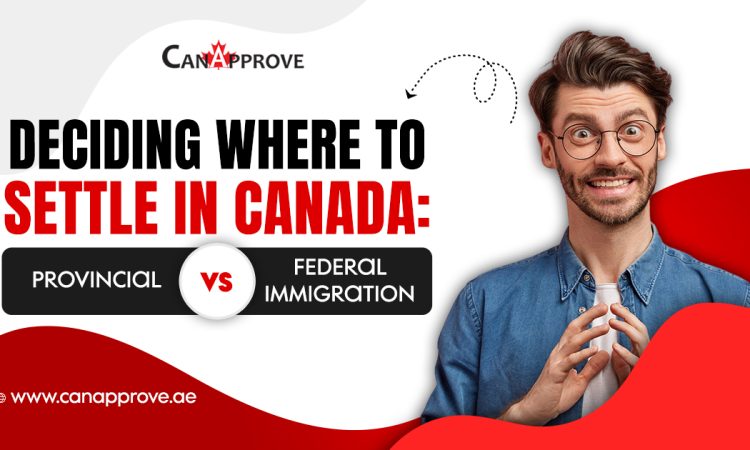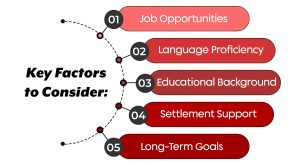Deciding to move to Canada is a big step, and where you settle can greatly impact your life there. Choosing where to build your new life in Canada is indeed an exciting step!
Canada’s vast provinces and territories offer diverse landscapes, cultures, and economic opportunities. But before you pack your bags, it’s crucial to understand the two main pathways to permanent residency: Provincial Nominee Programs (PNPs) and Federal Immigration Programs.
This blog will guide you through the key differences between these immigration streams, helping you decide which best suits your “settling in Canada” aspirations.
🍁What is a Provincial Nominee Program?
Provincial Nominee Programs (PNPs) are immigration programs run by individual Canadian provinces and territories, except for Quebec and Nunavut. These programs allow provinces to nominate individuals who meet their specific economic needs and labour shortages for permanent residence in Canada.
Each province has its own PNP customized to its economic and demographic needs. These programs allow provinces to address labour market shortages and select candidates who will contribute positively to their local economies.
One of the key advantages of PNPs is their flexibility and responsiveness to regional needs. They often target specific occupations or industries that are in demand within a particular province. Additionally, PNPs may offer smooth processes and lower eligibility criteria compared to federal programs, making them accessible to a wider range of applicants.
🍁What is a Federal Immigration Program?
On the other hand, federal immigration programs like Express Entry and the Canadian Experience Class are managed by the federal government. These programs are more general and not tied to any specific province or territory. If you’re selected through one of these programs, you’ll have the flexibility to settle anywhere in Canada.
The Express Entry system encompasses several streams, including the Federal Skilled Worker Program, the Federal Skilled Trades Program, and the Canadian Experience Class.
Federal programs are renowned for their efficiency and transparency. The Express Entry system uses a points-based system to assess candidates based on factors such as age, education, work experience, and language proficiency. Successful candidates are entered into a pool, from which they may receive invitations to apply for permanent residence based on their Comprehensive Ranking System (CRS) score.
🍁Applicants Selected by a Province or Territory
These programs are designed by individual provinces and territories to address their specific labour market needs.
BENEFITS:
💠Faster Processing: PNPs often display faster processing times compared to federal programs.
💠Targeted Occupations: If your occupation is in-demand in a particular province, a PNP can significantly increase your chances of success.
CONSIDERATIONS:
💠Provincial Nomination: You’ll need to be nominated by a specific province before applying for permanent residency.
💠Intent to Reside: You’ll need to demonstrate a genuine intention to live and work in the nominating province. This can involve factors like securing employment, enrolling children in school, or participating in community activities. Failing to demonstrate this intent can be considered misrepresentation, a serious offence.
🍁Applicants Selected by the Federal Government
These programs offer a more generalized pathway to permanent residency, with selection based on a points system that considers factors like education, work experience, language skills, and adaptability.
BENEFITS:
💠Openness: You’re free to settle anywhere in Canada upon obtaining permanent residency.
💠Express Entry: Federal programs often make use of the Express Entry system, known for its transparency and efficient processing.
CONSIDERATIONS:
💠Competition: Federal programs typically experience higher competition compared to PNPs.
💠No Provincial Nomination Boost: You won’t receive the additional points awarded through a provincial nomination.
🍁Key Considerations to Keep in Mind
When deciding between provincial and federal immigration routes, there are several factors to consider:
💠Job Opportunities: If you have a specific occupation or industry in mind, researching provincial labour market demands can help you identify provinces with plenty of job opportunities in your field.
💠Language Proficiency: Language requirements vary between provinces and federal programs. Depending on your proficiency in English and French, certain provinces may be more suitable for you.
💠Educational Background: Your education and qualifications may align better with the eligibility criteria of either provincial or federal programs. Evaluate which pathway offers a more straightforward route based on your educational background.
💠Settlement Support: Consider the availability of settlement services and support networks in your intended province. Some provinces offer additional support to newcomers to help them integrate into their communities.
💠Long-Term Goals: Think about your long-term aspirations in Canada. Are you seeking permanent residency for yourself and your family? Understanding the pathways to citizenship and permanent residence can influence your decision.
Whether you choose to settle through a provincial or federal immigration program, Canada offers a welcoming environment for newcomers from all over the world.
🍁Mobility Rights as a Canadian Permanent Resident
No matter your chosen path, obtaining permanent resident status is the ultimate goal. As a permanent resident, you can live, work, and study anywhere in Canada. This mobility right applies to both applicants selected by a province and those selected by the federal government. So whether you settle in bustling Toronto or peaceful Prince Edward Island, you’ll have the freedom to move around and make your home wherever you like.
🍁Wrapping Up
Both provincial and federal immigration routes offer pathways to achieving your dream of settling in Canada. The choice between the two depends on your individual circumstances, including your occupation, language proficiency, and long-term goals. Whether you opt for a provincial nominee program tailored to a specific province’s needs or pursue federal programs through the Express Entry system, Canada welcomes skilled immigrants who contribute to its vibrant and diverse society. Take the time to research and explore your options to start on your Canadian journey with confidence.
If you are feeling stuck or confused, don’t forget to take the help of an experienced immigration consultant like CanApprove consultancy. Get a FREE assessment from CanApprove’s Canada immigration experts NOW!
Let’s take “Settling in Canada” as the motto of this year.



